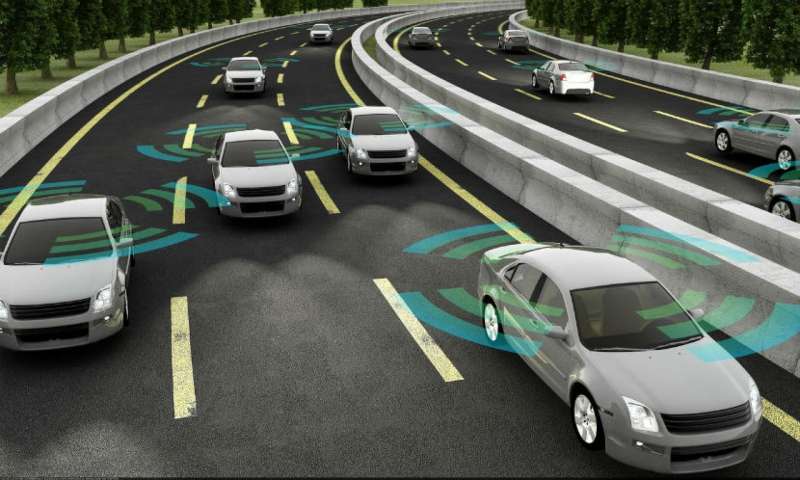WASHINGTON: Scientists are incorporating spider-inspired sensors into the shells of autonomous drones and cars so that they can better detect and avoid objects.
Better sensing capabilities would make it possible for drones to navigate in dangerous environments and for cars to prevent accidents caused by human error, said researchers from Purdue University in the US.
Current state-of-the-art sensor technology doesn’t process data fast enough — but nature does, according to the study published in the journal ACS Nano.
Researchers built sensors inspired by spiders, bats, birds and other animals, whose actual spidey senses are nerve endings linked to special neurons called mechanoreceptors.
The nerve endings — mechanosensors — only detect and process information essential to an animal’s survival. They come in the form of hair, cilia or feathers.
“There is already an explosion of data that intelligent systems can collect — and this rate is increasing faster than what conventional computing would be able to process,” said Andres Arrieta, an assistant professor at Purdue University.
Many biological mechanosensors filter data — the information they receive from an environment — according to a threshold, such as changes in pressure or temperature.
A spider’s hairy mechanosensors, for example, are located on its legs.
When a spider’s web vibrates at a frequency associated with prey or a mate, the mechanosensors detect it, generating a reflex in the spider that then reacts very quickly.
The mechanosensors wouldn’t detect a lower frequency, such as that of dust on the web, because it’s unimportant to the spider’s survival.
The idea would be to integrate similar sensors straight into the shell of an autonomous machine, such as an airplane wing or the body of a car.
The researchers demonstrated that engineered mechanosensors inspired by the hairs of spiders could be customised to detect predetermined forces.
In real life, these forces would be associated with a certain object that an autonomous machine needs to avoid.
However, the sensors they developed don’t just sense and filter at a very fast rate — they also compute, and without needing a power supply.
“There’s no distinction between hardware and software in nature; it’s all interconnected. A sensor is meant to interpret data, as well as collect and filter it,” Arrieta said.
In nature, once a particular level of force activates the mechanoreceptors associated with the hairy sensor, these receptors compute information by switching from one state to another.
Researchers at Purdue, in collaboration with Nanyang Technology University in Singapore and ETH Zurich in Switzerland, designed their sensors to do the same, and to use these on/off states to interpret signals.
An intelligent machine would then react according to what these sensors compute.
These artificial mechanosensors are capable of sensing, filtering and computing very quickly because they are stiff, Arrieta said.
The sensor material is designed to rapidly change shape when activated by an external force.
Changing shape makes conductive particles within the material move closer to each other, which then allows electricity to flow through the sensor and carry a signal.
This signal informs how the autonomous system should respond.
“With the help of machine learning algorithms, we could train these sensors to function autonomously with minimum energy consumption. There are also no barriers to manufacturing these sensors to be in a variety of sizes,” Arrieta said. (AGENCIES)
&&&
CINEMA-KHER
Will never retire from films, says Anupam Kher
MUMBAI, May 21:
In a career spanning 35 years, Anupam Kher has seen several highs and lows but the actor says he will continue giving his all to films and retirement is nowhere in sight.
The 64-year-old actor said one has to be excited about work to be able to continue for long.
“You have to be excited about your work. The day you carry the burden of ‘veteran’, ‘legend’, ‘thespian’ (it wouldn’t work). You’re given these titles to signal it’s time to retire. But I won’t retire from work even in the next 50 years,” the actor told reporters.
For Kher, the key to be a relevant artiste is to approach every film with a clean slate – without any baggage of past laurels.
“Everyday when I go to work, I tell myself I don’t know anything about acting. That’s the only way. If we take pride in our knowledge, we won’t learn something new.
“So I always walk in thinking I don’t know anything, it helps a lot. When you’re ready to learn from everyone, it’s great.”
Kher was speaking at the trailer launch of his upcoming film, “One Day”.
The actor said once he is done with his international commitment, he will resume work on domestic projects “from next year”. He currently stars in a New York-based medical drama “New Amsterdam” from NBC.
“In all these years, I have seen several ups and downs and for the first time I don’t have any film. I’ll be back from New York in a year’s time and we will start life all over again.”
Directed by Ashok Nanda and co-starring Esha Gupta, the film is scheduled to release on June 1. (AGENCIES)


